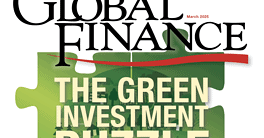Dear Reader
March 2010 | Vol. 24 No.3
In this month’s cover story we find that the alarming specter of sovereign risk has the potential to drive the global economy back into recession and spawn a new frenzy of risk aversion among investors. The impact on the corporate world could be as severe as that of the financial turmoil from which we’ve only just emerged.
As with the subprime mortgage debacle and the credit crunch it triggered, this potential meltdown has been brewing for a long time. Sovereign debt has long been a concern, but the financial turmoil of the past two years has forced at least some countries to admit they might have a bit of a problem. Unfortunately, when you’re a national government, admitting that you have a bit of a debt problem tends to make that problem harder to deal with rather than easieras Greece has made painfully clear.
But while Greece’s problems are deep, it is in many ways just the canary in the coal mine. The situation it faces is far from unique, which is part of the reason why finding a solution and preventing a default are so important on a global scale. If Greece defaults, the implications for other nations and the potential for disastrous knock-on effects on investor and corporate confidence are dire in the extreme.
It is hardly surprising, then, that the anxiety pervading global markets over the past month is eerily reminiscent of the atmosphere a year or so ago, although then it was the world’s biggest banks that were in the spotlight. The scenario we’re facing now is also unnervingly familiar: apparent prosperity built on mountains of debt, much of it concealed by the use of complex and opaque financial instruments. Just as the global financial services industry seemed, in the depths of the crisis, to be a house of cards in grave danger of collapse, so now does the developed world’s economic system.
The problem this time around, though, is that governments cannot spend their way out of the crisis. Instead, governments and multilateral lendersand perhaps the banks, toowill need to work together to engineer a smooth and orderly restructuring of those economies that are struggling under the weight of unmanageable debt. It will be a painful process, during which many countries will face higher taxes, reduced spending and potentially higher inflation. But unless those countries bite the bullet now, the future could be even more painful.
Until next month.
Dan Keeler
dan@gfmag.com

